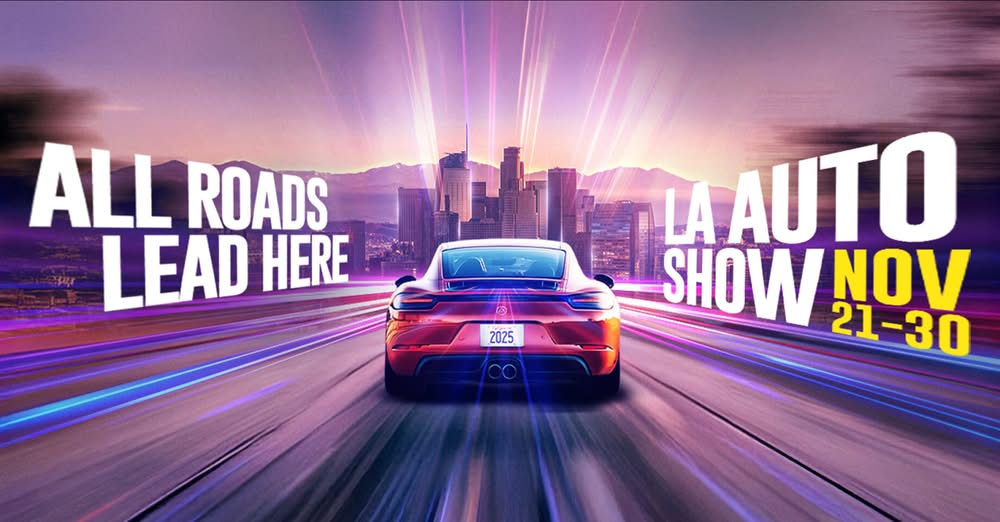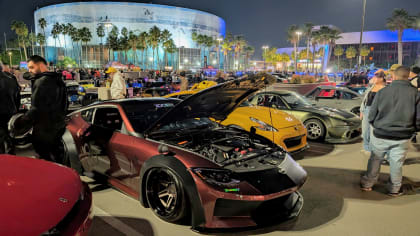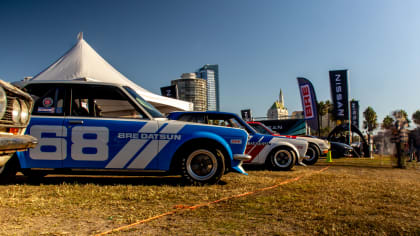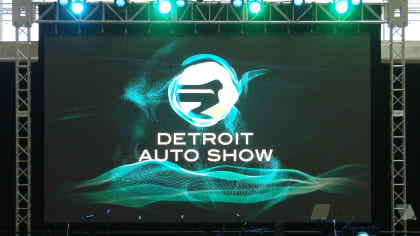THE GOLDEN ERA OF AUTO SHOWS

With the traditional auto show seemingly reaching the twilight of its illustrious existence, it’s time to reflect on the golden era of auto shows before it's erased from our memory.
By Christopher Merlo & Roy Nakano
Tue, Nov 11, 2025 05:00 AM PST
Featured image above: Jason Vines, the Head of Communications for Chrysler Corporation, convinced the car company to get Detroit's permission to unleash a herd of cattle on its streets as part of it's debut of the new Dodge Ram truck in 2008* (Stellantis/FCA press photograph).
DETROIT AUTO SHOW REFLECTIONS
Some might call it apotheosis of the auto show press conference. In their pursuit to command the 24-hour news cycle OEMs (original equipment manufacturers, as in the car companies) competed to outdo their competitors while out feting journalists. (“Just the facts” journalists for the most part cared less about the showmanship.) Some even hosted vehicle reveals off-site before the start of media days to get the jump on their competitors.
Auto show displays (stands) were elaborate even over the top, literally, with some two-tiered with private VIP spaces. Of course, there was the mandatory video wall along with cars on pedestals, turnstiles and even mounted on walls. It was as though money was no object as long as you grabbed front-page headlines and a breaking story on the evening news – both local and national. These were heady days for sure with big budgets and an army of attending journalists numbering 5,000 plus. Within this frenzy of two- and three-day media days the automotives rolled out double-digit vehicle premiers – both global and regional (North America).
Here we are today. What was the North American International Auto Show (NAIAS), the key word here is “international,” is now the regional Detroit Auto Show and it’s back to the basics of cars and trucks parked on carpets with all the pizzazz of dealer showrooms. Here’s a brief look back at what was and may never be again when it comes to auto show biz.

1992 NAIAS - The Sound of Breaking Glass Heard Round the World
Well, yeah maybe that is an exaggeration but not by much. These were heady days for the auto show circuit and OEMs. They were feeling their oats. There was lots of strut at the media days. One of the more outlandish and brazen stunts was the reveal of the 1993 Jeep Grand Cherokee. With former fighter pilot and Chrysler president Bob Lutz behind the wheel and Detroit Mayor Coleman riding shotgun, Lutz pulled a daredevil maneuver and drove the Grand Cherokee up the steps of Cobo Hall and thru a plate glass window. Not only did the stunt shatter expectations of what a reveal should be it launched the first generation of this iconic sport utility.

1995 NAIAS - The Flying Minivan Leapfrogs the Competition
Chrysler is often given credit for inventing the minivan. Some including Volkswagen politely disagree. Disputes aside, there’s no disputing that the first-generation Chrysler minivans – the Dodge Caravan and Plymouth Voyager – were wildly popular especially among suburban soccer moms. To introduce its redesigned, second-generation minivans Chrysler invoked the tranquil setting of a story book hour with Bob Lutz and Chrysler Chairman Bob Eaton seated on rocks reading aloud to the audience. As the story unfolded a minivan with Kermit the Frog behind the wheel leapfrogged overhead … and over the competition.

2003 NAIAS - Cadillac Sixteen Concept, a Fashion Show on Wheels
Your LACar team in Detroit never made the VIP list for special, private previews or gala offsite events at NAIAS. Afterall, we’re not The New York Times or Car and Driver. That reality was especially poignant when we were not invited to Cadillac’s unveiling of the Cadillac Sixteen Concept at the Detroit Opera House. We had to settle for a pedestrian viewing as the Sixteen’s “red carpet” entry on to the show floor and journey to the Cadillac stand was a roll down a roped-off runway (an isle way) lined by journalists, cameramen and gawkers. The Sixteen was jaw dropping beautiful and over the top powered by a 16-cylinder powertrain. We ooh and aah over exotics with 12. But 16! Come on. It left us wishing the Sixteen would become a reality. Today, we have the bespoke, handcrafted Cadillac Celestiq. Perhaps the Sixteen was its forbearer.

2006 NAIAS - A January Blizzard (Indoors)
What does Chrysler do to reveal the Aspen its first premium SUV? Well, you key in on the name. It evokes luxury. Fun on the slopes. So, let’s bring the winter inside. And that begets a simulated blizzard with zero visibility. As the “storm” subsides out rolls the 2007 Chrysler Aspen and yet another over-the-top reveal.

2008 NAIAS - A Cattle Call
It’s January, 2008. The dead of winter. It’s freezing cold outside, and your LACar team answers the call to action to cover the reveal of the 2009 Dodge Ram 1500 pickup (the brand now known as Ram Truck). But it’s outside the convention center. We’re on the clock. The auto show press conference schedule is rigid with hard start and end times with ten minutes between conferences so that journalists can race from one to the next. Did I say it was cold? We’re freezing waiting for the event to begin. It’s behind schedule. Problem is: the “talent” ain’t cooperating. Yep, cowboys on horseback are having difficulty driving a herd of Texas Longhorns down the street. This is an important reveal of a new pickup. What could go wrong? Go figure. Finally, here comes the urban cattle drive and with it the all-new Dodge Ram 1500. Chrysler gets its soundbite, “There’s no question, Dodge Ram has separated itself from the herd.” The PR stunt went on to be the talk of the show. – Christopher Merlo
*Editor’s note: Jason Vines was head of communications for Chrysler Group from December, 2003 until December, 2007, and is credited with some of the company’s wildest new car debut themes.

LA AUTO SHOW REFLECTIONS
From a skating rink to going international
The LA Auto Show has come a long way since 1907, when it was held at Morley’s Skating Rink off of Grand Avenue. In 1908, it moved to the basement of Hamburger’s Department Store. By 1915, it was called the Broadway Automobile and Flower show, occupying two floors of a vacant department store. In 1929, an electrical short circuit engulfed the entire show.
After a hiatus in the 1940s due to World War II, the show reopened in 1952, taking on the designation “International”, as in the Los Angeles International Auto Show. It was a nod to the interest in European cars that veterans acquired after returning from overseas. The “International” designation has been used on and off by the LAAS organizers since then, but it wasn’t until the 1970s when the show was officially recognized by the Organisation Internationale des Constructeurs d’Automobiles (OCIA) as one of the four auto shows in North America with a global presence (the others being in Chicago, Detroit, and New York).

Rings Around the Golden '90s
In 1993, the show began blossoming into the mega-show we know today with the expansion of the Los Angeles Convention Center. Just before the expansion, much of the LA Auto Show activities took place in the parking lot of the Convention Center and in tents around the same area.
In just the year preceding the expansion, LACar's Doug Stokes recalls pulling up to a parking spot at the 1992 LA Auto Show in a new Saturn L-Series Sedan and found that he was parked next to the then Chevrolet Division VP/General Manager, Jim Perkins:
"As we both got out of our cars, he looked over at mine and sort of scowled. I said: 'Gee, Mister Perkins, it’s one of yours…' (meaning a General Motors product). The man who saved the Corvette fake-scowled again and then real-laughed saying '...That ain't one of mine son!'
As we all found out a just few miles down the line, almost no one at GM liked the odd-duck Saturn brand very much and many potential consumers were confused by the (exceedingly) unusual sales set-up that outright mandated the window sticker price as THE price that would be paid right on the proverbial barrel head for a Saturn automobile. (The semi-unique marque folded it’s composite body material tent in 2010.) - Doug Stokes
Doug's Long-Suppressed Memories
Soon thereafter, Doug Stokes worked as the national PR point person for a public-private outreach effort called the Chrevrolet-Geo Environmental Program. He shares a long-suppressed auto show memory (his words) from this period:
"We supported and worked closely with local environmental groups across the country assisting them in their advocacy for local tree-planting and/or clean up efforts for local rivers, lakes, and streams.
We attended a number of major automobile shows across the country on behalf of Chevrolet, setting it up as an adjunct to the main Chevy-Geo exhibit to inform show-goers of the local organization’s community efforts, passing along information about Chevy’s corporate commitment to environmental awareness.

There was one cycle of car shows that we attended that still rings in my ears. It was probably the year after “Stomp!” was a big hit on Broadway and one of the manufacturers (and I can’t really remember which*) decided that they might get a bit more attention if they produced their own BIG Auto Show version.
If you don’t recall, “Stomp!” was a cascade of rhythmic percussion and movement put on by what appeared to be a rather rowdy brigade of young men and women who jumped, jammed, gyrated, and generally just gesticulated to the sound of trash can lids being banged together in an ear-splitting concert of cacophony that violently shattered the air every forty-five minutes of the show day starting at 1PM. Ear-splitting is a pretty good one word review. Of course it seemed to last forever (and the ringing in one’s ears seriously threatened to do JUST that).
Of course (you didn't even have to guess, did you?), our paean to the environment, you know, the one dedicated to green grass, beautiful trees, and clear skies … our display unit was RIGHT (damn) NEXT (damn) DOOR.
By 2pm of the first day, and not looking at my watch, I developed a keen sense of (what could easily be categorized as “foreboding”) sensing when one of these obnoxious noise fests was going to bust ears, and scare babies again. I could hear the trash can lids being passed out like trench guns along the Maginot Line. If “Stomp” sold cars, I’m in the wrong business.
All part of another day at the Auto Show." - Doug Stokes
In the mid-to-late 1990s, Doug Stokes wore another hat. This time as the Editor of the Motor Press Guild's MilePost. He remembers the show during that period for another reason:
“I miss the constant cacophony of the (BANG!) airbag demo setups from the shows in the mid-late 90's. It's my guess is that a sizable portion of the people who watched those shows went away thinking that, after deployment, the damn bag simply retreated back into the steering wheel hub, all nice and ready for the next accident as the demo one did after it was deployed about every 15 minutes or less at the show.”

2003 LAAS - The Keynote by Bob Lutz
2003 was a memorable moment at the LA Auto Show because of General Motors Vice President Bob Lutz’s famous statement as the Motor Press Guild keynote speaker. It was right about the time the breakthrough second-generation Toyota Prius reached these shores. Someone asked him about Toyota’s hybrid Prius. “There’s no business case for hybrid cars,” was his dismissive reply. Of course, the Prius then went on to put a huge dent in domestic car sales, while collecting virtually all of the important automotive awards along the way that year.
Two years after the Motor Press Guild event, Lutz admitted GM missed the mark on the Prius. “We business-cased it, took a hard, analytical look and thought the engineering and investment were irresponsible vis-a-vis our shareholders. We failed to appreciate what Toyota has basically treated as an advertising expense.” Toyota was perceived by consumers as a company helping to save the plant. Said Lutz, "Toyota very cleverly has used hybrids to gain an improved perception of the brand."
2006 LAAS - Moving out of Detroit’s shadow
The golden era of the LA Auto Show really began in 2006, when it was moved from early January to its current schedule of late November through early December. That allowed Los Angeles to get out of the shadow of Detroit’s then-designated North American International Auto Show, and gave reason to car companies to make Los Angeles an ideal venue for new car debuts.
Hyundai & the Mermaids at Hotel Figueroa
Starting around 15 years ago, Hyundai had been hosting exceptional after-show parties for the press at the top of the Hotel Figueroa in Downtown Los Angeles. The parties featured great entertainment, and the entertainers would be kept a secret right up to the beginning of the parties. In past years, the performers included Joan Jet and the Blackhearts, Kool and the Gang, Alanis Morrissette, Ziggy Marley, and John Legend.

Sometimes the concerts had a more light-hearted approach, like when Jack Black performed in his Tenacious D persona, or Jeff Bridges and T. Bone Burnett getting together to perform songs from the Oscar-winning movie Crazy Heart. All the while, mermaids would be swimming below the plexiglass floors under your feet. We could always count on Hyundai to have the best entertainment. AutoDesignO's John Grafman remembers the mermaids and the music:
“I remember the mermaids. I also remember the time security forced me to delete images of Joan Jett from my DSLR, as cameras were not supposed to be allowed at that press only event (but they didn’t stop anyone with a cell phone camera). I’m not sure why Hyundai didn’t think press would have a camera coming straight from the press day at the convention center, but that’s what took place.”
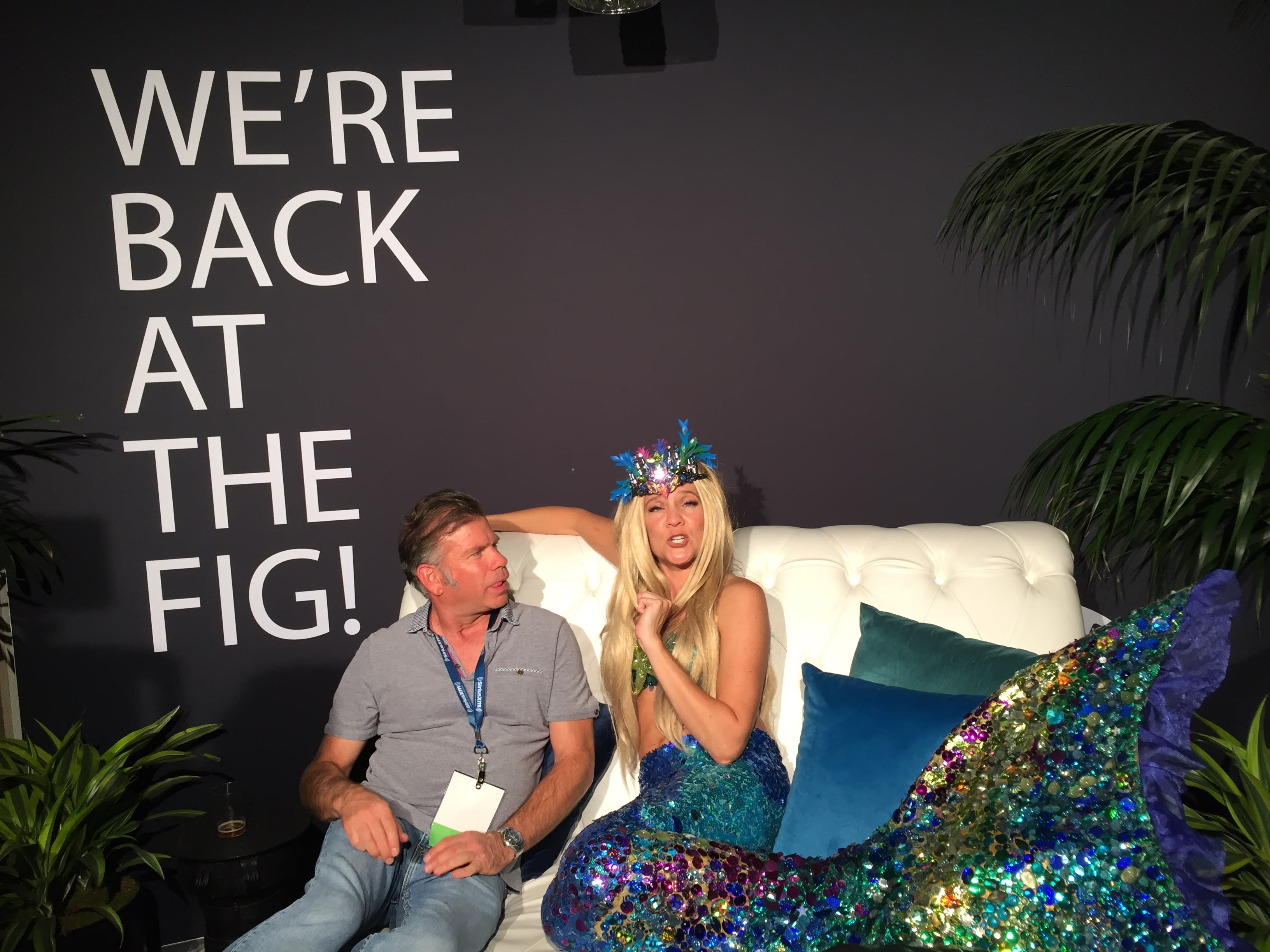
2014 LAAS - Reaching New Heights
By 2014, the show had a record 65 automotive debuts, albeit this included North American and auto show debuts as well as world debuts. Connected Car Expo, a networking event for automotive and technology professionals, was merged with the show's Press & Trade days to create AutoMobility LA. By 2016, AutoMobility LA also included four days of networking, three days of press previews, and a Press & Trade Days Kickoff Party the night before the AutoMobility LA Conference.
Press kit designs reached a new peak, with manufacturers jockeying to outdo each other with the most imaginative ones. Says Doug Stokes about those kits:
“I remember the mad scramble among a throng of "media" people (none of whom I recognized as fellow Motor Press Guild members) who descended on the pressroom with wagons and rolling suitcases to secure as many of those big nicely-bound three-ring press kits of the past era as possible (and to put them up for sale shortly thereafter). I CAN name names* if called for.”
As we developed this report, it became clear that LACar has enough material to write a separate story on the golden era of automotive swag. Be sure to read John Grafman's "The Golden Era of Automotive Press Kits" - Roy Nakano
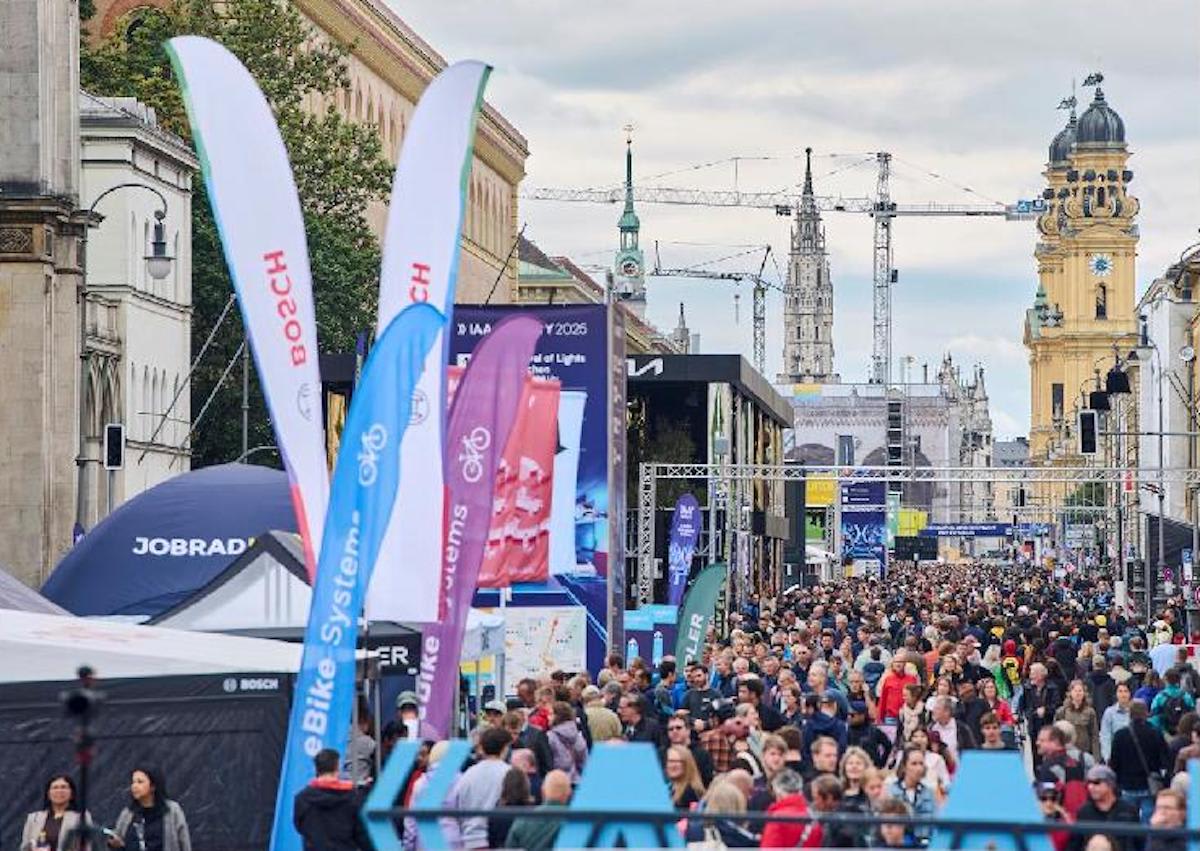
FRANKFURT AND PARIS REFLECTIONS
Every other year, two of the largest automotive shows in the world are held in France and Germany on a rotating basis. In 2001, the International Motor Show Germany (Internationale Automobil-Ausstellung in German) was held. And the following year, it was the Paris Motor Show (Mondial de l'Automobile in French). We attended both.
2001 International Motor Show Germany (IAA) - 9/11
LACar’s Bill Wright was at the 2001 show in Germany when he noticed journalists all congregating around large television monitors. The day was September 11th, and the planes had just crashed into the World Trade Center towers in New York. What was happening in New York overshadowed the IAA in Frankfurt, Germany. The organizers cancelled the opening ceremony as were other show elements and any loud music, but the exhibitions remained open. The President of the German Association of the Automotive Industry, Bernd Gottschalk, explained his decision:
"Because we could not permit terrorist forces to take away our freedom of action. And because, as a key international sector, we have a responsibility not to allow things to grind to a halt."
The decision was well-received by the public. More than 800,000 people went on to visited this quieter version of the IAA in Frankfurt.

2002 Paris Motor Show
The following year, in 2002, Bill Wright, John-Fredrik Wright, and I attended the Paris Motor Show. It was just a year after 9/11, and sentiment towards Americans was at an all-time high. The French newspaper Le Monde editorialized after the attack that “we are all Americans” and provided full-page English language coverage of the events.
There was a time when manufacturers went the distance for automotive journalist luncheons. This was especially true at the Paris Motor Show. The French take this car show seriously. Citroën treated the American journalists with the French-sounding publication (we were La Car before it became LACar) to a luncheon complete with no less than five glasses for five different drinks. Not to be outdone, Volkswagen asserted itself as a high-end player with a Phaeton-like meal to the press that included truffles and foie gras. Newspapers and magazines at every street side newsstand publicized the event.
Four months after the 2002 Paris Motor Show, a United States-led coalition invaded Iraq, resulting in the overthrow of the Ba'athist government of Saddam Hussein, and the rest, as they say, is history. - Roy Nakano
LA Auto Show
When:
November 21-30, 2025
Show Hours
Where:
LA Convention Center
1201 S Figueroa Street
Los Angeles, 90015
What:
Automotive Brands and Ride & Drives
Tickets:
LA Auto Show Tickets
For more information:
LA Auto Show website
For information about the Detroit Auto Show, go to detroitautoshow.com.
For information on the Paris Motor Show (Le Mondial de l’Auto), click here.
For information on the International Motor Show Germany (IAA), click here.
About The Authors
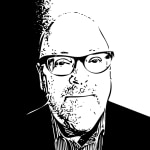
Christopher Merlo, a.k.a Mr. Detroit, learned to drive on the streets of the Motor City. Friday and Saturday nights of his youth were spent cruising Detroit's Telegraph Road and Woodward Avenue while listening to rock and roll resulting in serious addictions to road machines, pop music, and road food. For Chris, it's all about car culture. These days Chris satisfies his various appetites by advising automotive clients and writing their corporate communications.
Together with
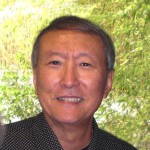
Roy Nakano gave birth to LACar in the late '90s, having previously delivered LA Audio File back in the '80s. Aside from the occasional review, Roy likes to stray off the beaten automotive path: "Six Degrees of Reparations" reflected on the regretful ethical paths taken by car companies throughout history. "Traveling Through the Past and Present of the Green Book" looked at businesses that took a stand against racism and the man that wrote the book on where to find them. "Best Cars to Drive in Rush Hour Traffic" was an LACar guide published in the pre-GPS era. "In Search of the First Datsun 510 Tuner" looked at one of the milestones in the origin of import tuners. And "Us vs Them" examines the instances when rivalry among automotive enthusiasts crossed the line to violence and even death.


